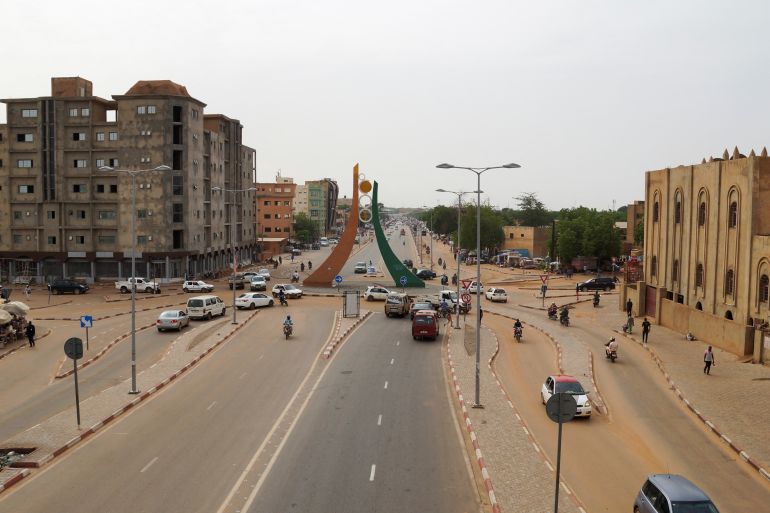Niger’s military rulers ask for help from Russian group Wagner
The new military government seeks help from Wagner mercenaries against ECOWAS intervention, according to a news report.

Niger’s coup generals have asked for help from the Russian mercenary group Wagner as the deadline nears for it to release the country’s removed president or face possible military intervention by the West African regional bloc, a news report says.
The request came during a visit by a coup leader – General Salifou Mody – to neighbouring Mali, where he made contact with someone from Wagner, Wassim Nasr, a journalist and senior research fellow at the Soufan Center, told The Associated Press.
Keep reading
list of 4 itemsWhy was Pakistan’s former Prime Minister Imran Khan arrested?
France backs ECOWAS push to reverse Niger military coup
Politics and polemics: What the coup in Niger tells us
Three Malian sources and a French diplomat confirmed the meeting first reported by France 24, Nasr added.
“They need [Wagner] because they will become their guarantee to hold onto power,” he said, adding the private military company is considering the request.
Niger’s military government faces a Sunday deadline set by the regional bloc known as ECOWAS to release and reinstate the democratically elected President Mohamed Bazoum, who has described himself as a hostage.
Defence chiefs from ECOWAS members finalised an intervention plan on Friday and urged militaries to prepare resources after a mediation team sent to Niger on Thursday was not allowed to enter or meet with military government leader General Abdourahmane Tchiani.
After his visit to Mali, run by a sympathetic military government, Mody warned against military intervention, promising Niger would do what it takes not to become “a new Libya”, Niger’s state television reported.
Niger has been seen as the West’s last reliable counterterrorism partner in a region where coups have been common in recent years. Military leaders have rejected former coloniser France and turned towards Russia.
Wagner operates in a handful of African countries, including Mali, where human rights groups have accused its forces of deadly abuses.
‘It’s all a sham’
Some residents rejected the military’s takeover.
“It’s all a sham,” said Amad Hassane Boubacar, who teaches at the University of Niamey.
“They oppose foreign interference to restore constitutional order and legality. But on the contrary, they are ready to make a pact with Wagner and Russia to undermine the constitutional order … They are prepared for the country to go up in flames so that they can illegally maintain their position.”
Niger’s military leaders have been following the playbook of Mali and neighbouring Burkina Faso, also run by military governments, but they are moving faster to consolidate power, Nasr said.
“[Tchiani] chose his path so he’s going full-on it without wasting time because there’s international mobilisation.”
One question is how the international community will react if Wagner comes in, he said. When Wagner came into Mali at the end of 2021, the French military was removed soon afterwards after years of partnership. Wagner was later designated a “terrorist” organisation by the United States, and international partners might have a stronger reaction now, Nasr said.
And much more is at stake in Niger, where the US and other partners have poured hundreds of millions of dollars of military assistance to combat the region’s growing security threat.
No details on possible intervention
It’s unclear what a regional intervention would look like, when it would begin, or whether it would receive support from Western forces. Niger’s military government has called on the population to watch for spies, and self-organised defence groups have mobilised at night to monitor cars and patrol the capital.
“If the junta were to dig in its heels and rally the populace around the flag – possibly even arming civilian militias – the intervention could morph into a multifaceted counterinsurgency that ECOWAS would not be prepared to handle,” said a report by the Hudson Institute.
While some in Niger are bracing for a fight, others are trying to cope with travel and economic sanctions imposed by ECOWAS after the coup that have closed land and air borders with ECOWAS countries and suspended commercial and financial transactions with them.
Residents said the price of goods is rising and there’s limited access to cash.
“We are deeply concerned about the consequences of these sanctions, especially their impacts on the supply of essential food products, pharmaceuticals, medical equipment, petroleum products and electricity,” said Sita Adamou, president of Niger’s Association to Defend Human Rights.